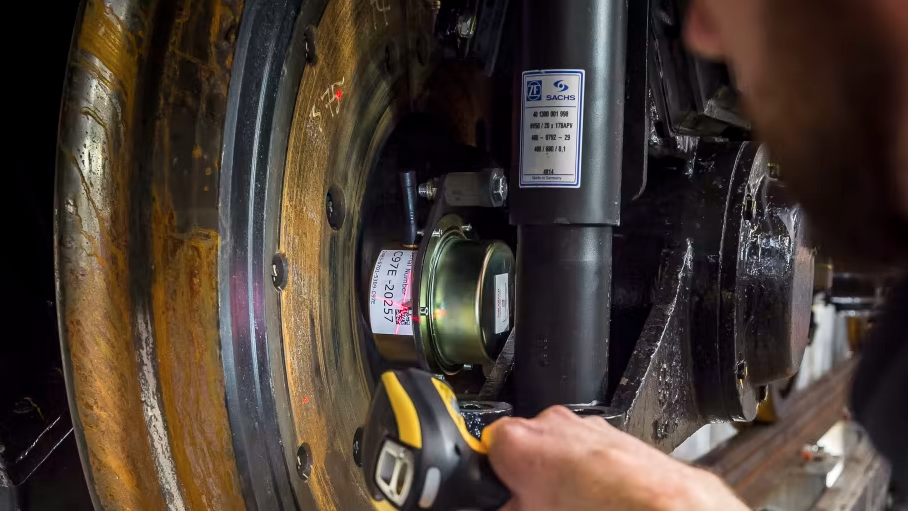Hitachi Rail’s digital sensors to spot track faults, cut rail disruption and improve safety

- Hitachi-Perpetuum is trialling technology in Scotland that brings track and train together digitally
- Successful trial could pave the way for smart mobility system that reduces passenger disruption and maintenance costs, while improving safety
- Network Rail, Porterbrook and ScotRail are enabling the development of cutting-edge digital technology in the UK
Hitachi Rail and its subsidiary, Perpetuum, have been awarded a contract by Network Rail to develop the first real-time digital solution that monitors, and eventually predicts, sections of track that affect ride quality and require maintenance.
The monitoring equipment is currently installed on trains across Scotland’s networks including the North Clyde Line, The Borders, and Fife Circle. By fitting digital sensors to trains, the pilot offers major benefits to the railway that include:
- Reducing disruption to passengers and improving safety
- Lessening the risk to track workers and cutting maintenance costs
- Improving the performance of the network and the ride quality of trains
- A further movement towards the development of intelligent rail infrastructure that can predict and plan preventative maintenance
Network Rail launched a half million-pound competition to develop and introduce new technology to improve track maintenance in the next control period (mid-2024). As part of this programme, it has agreed a contract with Perpetuum to expand its ride quality trial to Scotland. This development follows successful trials of Perpetuum’s ride quality monitoring technology with Network Rail on the West Coast main line in 2019.
Identifying track faults
The regular use of Scotland’s railway means that overtime parts of the 1,750 mile track degrade and need repair, which results in bumpy journeys for passengers, speed limits, and weeks of potentially disruptive maintenance. At present, locations of ‘rough ride’ are reported by drivers, followed by manual inspection by maintenance crews walking on the track.
Perpetuum’s solution automates this monitoring and reporting, which improves the safety of the railway.
Working in partnership with Network Rail, ScotRail and Porterbrook, Perpetuum is using its self-powered monitoring technology to measure data in real-time between the train and the track. This is achieved by installing sensors with gyroscopes and accelerometers, either in the carriages or on the wheels, of trains already in passenger service.
At this stage of the development, Perpetuum solution can identify the onset of warping or changes to the track. By applying digital analytical tools, Perpetuum can build a picture of areas that are at risk, requiring inspection or maintenance in the future.
The ability to identify and fix this before it causes passenger disruption means it can be a preventative countermeasure, while simultaneously creating intelligent rail infrastructure.
Benefits of installing the digital technology on trains
Safety alerts on sections of track regularly result in weeks of speed restrictions, which can lengthen journey times for passengers’ or even result in reduced timetables. For Network Rail, the ability to identify fix tracks early will improve reliability and minimise disruption.
For operators, poor track ride quality can affect train performance. The data Perpetuum collects can help identify trains that are more prone to poor ride quality over certain types of tracks. This in turn can help identify where preventative maintenance can take place on train to maintain passenger comfort.
Perpetuum remote sensors are particularly easy to fit to existing fleets due to their ability to self-power – using patented energy-harvesting technology – they require no extra wiring or power sources.
Jim Brewin, Head of UK & Ireland, Hitachi Rail said:
“Introducing in-service monitoring technology to improve ride quality demonstrates how Hitachi Rail can utilise digital solutions that support track maintenance. This ability to bring train and track together can solve issues for both passengers and train operators.
“Hitachi Rail is committed to constantly pioneering and championing new technology to make our railways safer and more reliable.”
Stephanie Klecha, Head of Digital Services, Porterbrook said:
“Porterbrook is delighted to support Perpetuum’s data-led approach alongside train operators and Network Rail which can deliver a better passenger service across these fleets. This project is a great example of how rolling stock data can improve and enhance the industry’s understanding of track behaviour in the run up to rough ride events. This will enable tailored proactive maintenance to solve this important industry challenge.”
David Lister, Safety, Engineering & Sustainability Director, ScotRail said:
“The performance and reliability of our trains is always a top priority which requires both reliable trains and reliable track infrastructure so it’s great to see Hitachi Rail and Perpetuum developing this innovative digital technology to monitor and then predict which sections of track need maintenance using technology fitted to our passenger trains.
“Anything that can increase comfort for our customers by making their journeys smoother, while reducing the need for unplanned downtime for stretches of track is to be welcomed and is a tangible example of train and track working together to provide a safe, efficient and reliable railway.”
Perpetuum is owned by Hitachi Rail, one of the world’s leading transport system providers. Hitachi Rail has a proud history of using innovation and digitisation to create sustainable modes of transport that both safeguard our environment and make sure passengers’ journeys are enjoyable every day.
A key element to Hitachi’s focus on innovation is working to develop all aspects of passenger journeys, from start to finish, through their Smart Mobility commitment. Through digital innovation, different aspects of a person’s journey – from ticketing to train control – can be connected to better manage and optimise the whole journey. Perpetuum’s innovative sensors are yet another example of how Hitachi Rail are developing these digital solutions to improve the quality of public transport journeys for passengers around the world.
